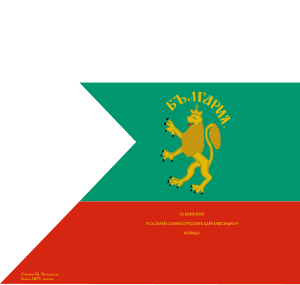Opalchentsi
| Volunteer (Bulgarian: опълченци) |
|
|---|---|
| Participant in the Serbo-Turkish War and the Russo-Turkish War of 1877–1878 | |
|
The standard of the Bulgarian Opaltchentsi
|
|
| Active | 1877-1878 |
| Ideology | Bulgarian nationalism |
| Leaders | Collective leadership |
| Area of operations | Bulgaria |
| Strength | 40,000 |
| Originated as | Bulgarian Legion |
| Became | Bulgarian army |
| Allies |
|
| Opponents |
|
| Battles and wars | Russo-Turkish War of 1877–1878 |
Opalchentsi (Bulgarian: опълченци) were Bulgarian voluntary army units, who took part in the Russo-Turkish War of 1877–1878. The people in these units were called opalchenets-pobornik (опълченец-поборник) meaning "volunteer combatant".
The Bulgarian voluntary army units for the Russo-Turkish War were gathered after the manifesto of Alexander II of Russia, announcing the War. The meeting point of the Bulgarian volunteers in Russia was the city of Samara. The Bulgarian Opalchentsi were given the Samara flag bearing the images of the Holy Mother and Saints Cyril and Methodius (the flag is kept in the National Museum of Military History in Sofia). The Opalchentsi took an active part in the Second and Fourth Battle of Shipka Pass and after the end of the war went on to form Bulgaria's army.
One of the poems in Ivan Vazov's Epic of the Forgotten, namely "Opalchentsite na Shipka", is dedicated to them. Opalchenie Peak in Vinson Massif, Antarctica is named after the Bulgarian Volunteer Force in the 1877-1878 Russo-Turkish War and the Macedonian-Adrianopolitan Volunteer Corps in the 1912-1913 Balkan Wars.
Coordinates: 78°34′02″S 85°34′53″W / 78.56722°S 85.58139°W
...
Wikipedia

